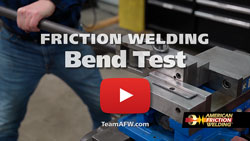Rotary friction welding (RFW) is a superior method for welding Inconel components compared to conventional welding processes, e.g., MIG, TIG welding (tungsten inert gas), and plasma arc welding. RFW never uses filler metals and requires minimum pre-weld joint preparation, displacing oils, oxidation, and other contaminations during welding. The metals reach a plasticized state before forging, creating a very narrow heat-affected zone (HAZ), protecting the molecular structure of the components while eliminating porosity and hot cracking. Friction welding creates a bond as strong as the base materials.

Inconel Weld Specification
AFW works with customers to define a Weld Procedure Specification (WPS) that sets specific tolerance parameters for each part. Equipped with advanced high-precision controllers, our welding centers monitor all critical variables throughout the weld cycle guaranteeing product conformance – RPMs (rotations per minute), PSI (weld pressure), and total stock length loss. Controlling forge ramp and deceleration is critical in maintaining consistent and standardized welds. The operator receives immediate notification if a weld parameter is out of range to take corrective action. We record data from each weld cycle for future parameter review and analysis.
This graph displays the RPMs, PSI, and stock displacement from the abovementioned Inconel to Inconel friction welding.

Inconel Weld Bend Test
Friction welding bend tests are common to assess mechanical integrity and bonding strength. This testing method involves subjecting a friction-welded specimen to bending forces, which simulate real-world conditions and evaluate the weld’s resistance to deformation. A predetermined load is applied gradually to the sample during the test to achieve the desired bend angle. The test measures parameters such as the ultimate bending moment, the yield strength, and the ductility of the weld. By performing friction welding bend tests, engineers and researchers gain valuable insights into the quality and reliability of friction-welded joints, helping to ensure the structural integrity and performance of welded components in various applications.
Working With Inconel
Friction welding of Inconel, a high-performance nickel-chromium alloy, is a highly effective and efficient joining process used in various industries. Inconel alloys are known for their exceptional strength, heat, and corrosion resistance, making them ideal for aerospace, power generation, and oil and gas applications. Inconel is available in various grades, compared to stainless steel limitations, but is also more expensive. Rotary friction welding generates heat through friction between two surfaces and applies pressure to create a solid-state bond.
One of the significant advantages of friction welding Inconel is its ability to produce high-quality, defect-free joints. The process is performed without the need for melting the material, minimizing the formation of undesirable porosity, oxides, or voids that can weaken the joint. This results in welds with superior mechanical properties, including high tensile strength.
Friction welding also offers other notable benefits. It is a relatively quick process, with rapid cycle times and minimal post-weld cleaning or finishing required. The process can be automated, providing consistency and repeatability in production. Additionally, friction welding Inconel allows for joining dissimilar metals or alloys, expanding the possibilities for complex engineering designs and multi-material assemblies.
- Melting Point: 2,350 - 2,460°F | 1,290 - 1,350°C
- Thermal Conductivity: 15 W/m-K (watts per meter per kelvin)
- Grades: Inconel Alloy 600, 601, 617, 625, Inconel 625 filler metal, 625LCF, 686, 690, 693, 706, 718, 718SPF, 725, 740H, X-750, 75, 783, 22, C-276, G-3, HX, and N06230
Other Welding Combinations: Carbon Steel to Stainless Steel, Copper to Aluminum, Hastelloy Welding, Inconel to Inconel, Nitronic 50, Stainless Steel to Mild Steel, Stainless to Stainless
